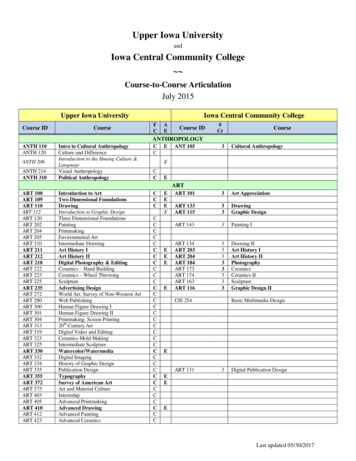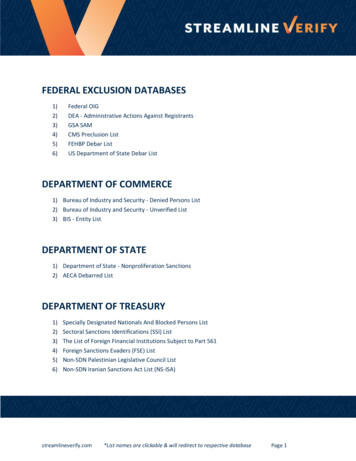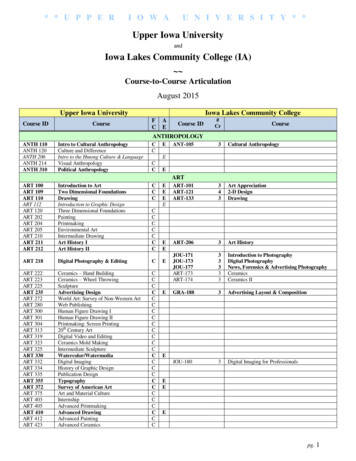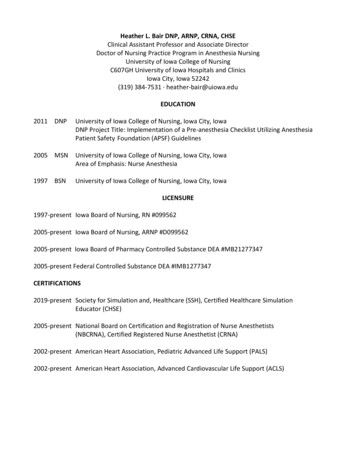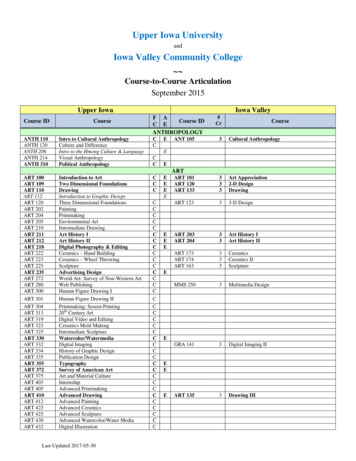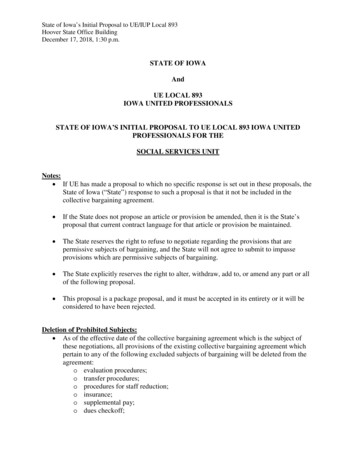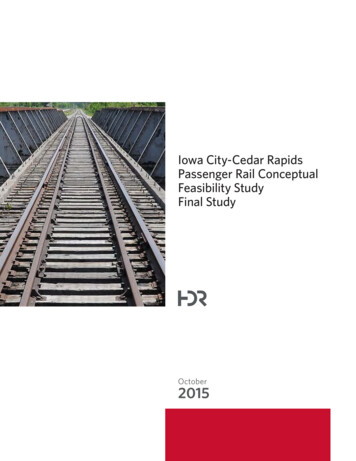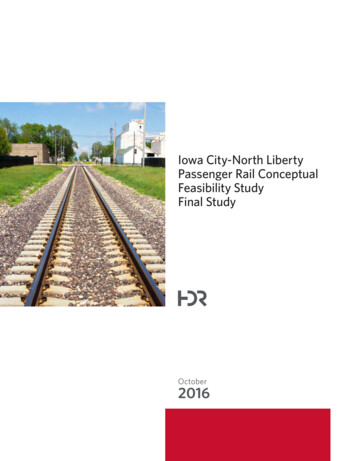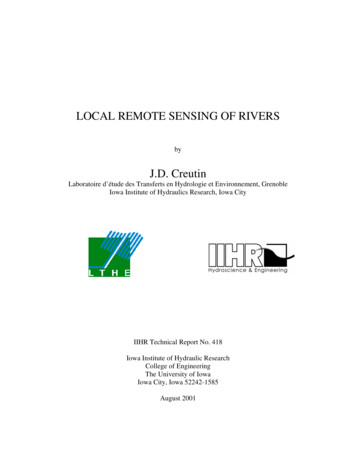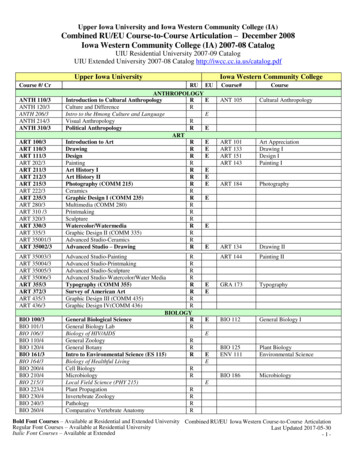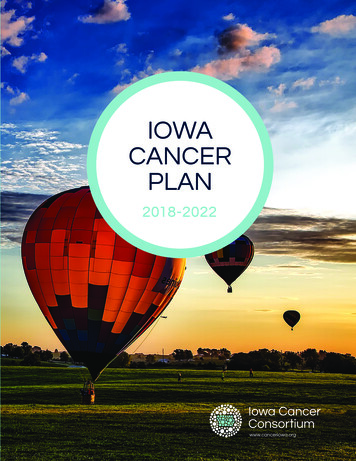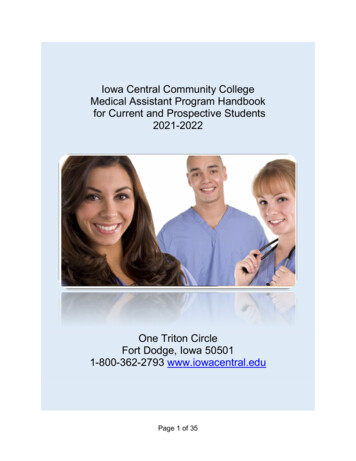
Transcription
Iowa Central Community CollegeMedical Assistant Program Handbookfor Current and Prospective Students2021-2022One Triton CircleFort Dodge, Iowa 505011-800-362-2793 www.iowacentral.eduPage 1 of 35
Page 2 of 35
Program HandbookThis Medical Assistant Program Handbook provides prospective students withinformation to review when considering application to the Iowa Central MedicalAssistant Program. Prospective students may review the most current ProgramHandbook and are encouraged to contact the Admissions Office or Medical AssistantProgram Coordinator, Kelly Meyer at 515-574-1308 or meyer k@iowacentral.edu ifinterested in enrolling.The Medical Assistant Program Handbook also provides accepted students withprogram policies, procedures, and expectations.Program OverviewMedical assistants work alongside physicians, mainly in outpatient or ambulatory carefacilities, such as medical offices and clinics. Employers are seeking medical assistantsbecause they are the only allied health professional trained to perform bothadministrative and clinical duties. Most medical assistants work full-time with benefits.Medical assistants usually work weekdays during normal business hours whenphysician's offices are open to see patients.The Medical Assistant Program at Iowa Central Community College prepares studentswith theory and entry-level competence in the performance of administrative and clinicalduties. The diploma program includes two semesters of theory and lab, followed by a30-day summer practicum. The program begins in the fall and concludes in the summer.Students must earn a passing grade (as outlined in individual course syllabi) in allMedical Assistant curriculum courses and meet the prerequisites to progress in theprogram. Students may opt to continue their education to obtain an AAS degree inMedical Assisting, completing an addition 13 credit hours of required coursework and 6credit hours of elective coursework beyond the diploma requirements.After successful completion of the medical assistant diploma program, students areeligible to take a national certification exam. After qualifying for and passing the exam,graduates can work as certified medical assistants (CMA, AAMA) in the following states:Alabama, Alaska, Arizona, Arkansas, California, Colorado, Connecticut, Delaware,Florida, Georgia, Hawaii, Idaho, Illinois, Indiana, Iowa, Kansas, Kentucky, Louisiana,Maine, Maryland, Massachusetts, Michigan, Minnesota, Mississippi, Missouri, Montana,Nebraska, Nevada, New Hampshire, New Jersey, New Mexico, New York, NorthCarolina, North Dakota, Ohio, Oklahoma, Oregon, Pennsylvania, Rhode Island, SouthCarolina, South Dakota, Tennessee, Texas, Utah, Vermont, Virginia, Washington, WestVirginia, Wisconsin, Wyoming.Page 3 of 35
Program Vision StatementThe Iowa Central Community College Medical Assistant Program prepares graduateswho are aware of and responsive to the needs of area healthcare providers andemployers, patients, and the community.Program Mission StatementThe Iowa Central Community College Medical Assistant Program is committed tomeeting the educational needs of students preparing for a career as a medicalassistant. Program graduates become competent medical assistants who are able tomeet the expectations of area healthcare providers and employers and contribute to thehealth and well-being of their patients and the communities within which they live andwork.Program AccreditationAccreditation is a process by which an assigned agency reviews the quality of aprogram within an educational institution. Accreditation helps assure prospective andcurrent students that a program meets minimum standards of quality developed byprofessionals involved in the field. Along with certification (discussed later),accreditation helps assure program graduates are prepared and qualified to enter theworkforce and provide quality health care. (www.caahep.org, 2013). The Iowa CentralCommunity College Medical Assistant Diploma Program is accredited by theCommission on Accreditation of Allied Health Education Programs (CAAHEP)upon the recommendation of the Medical Assisting Education Review Board (MAERB).Commission on Accreditation of Allied Health Education Programs (CAAHEP)9355 113th Street North #7709Seminole, Florida 33775727-210-2350 (phone)www.caahep.orgMedical Assisting Education Review Board (MAERB)20 North Wacker Drive, Suite 1575Chicago, Illinois 60606312-392-0155 (phone)www.maerb.orgPotential CareersMedical assistants work alongside physicians, mainly in outpatient or ambulatory carefacilities such as medical offices and clinics. Medical assistants can choose to work ineither in primary care or medical specialties such as obstetrics and gynecology,pediatrics, dermatology, urgent care, general surgery, internal medicine, nephrology,cardiology, neurology, occupational medicine, and others. Additional potential jobopportunities include working at blood donation centers as phlebotomists, assisting withinsurance physicals, and health coaching.Page 4 of 35
Iowa Core Performance Standards for Health Care Career ProgramsIowa Community colleges have developed the following Core Performance Standardsfor all applicants to Health Care Career Programs. These standards are based uponrequired abilities that are compatible with effective performance in health care careers.Applicants unable to meet the Core Performance Standards are responsible fordiscussing the possibility of reasonable accommodations with the designatedinstitutional office. Before final admission into a health career program, applicants areresponsible for providing medical and other documentation related to any disability andthe appropriate accommodations needed to meet the Core Performance Standards.These materials must be submitted in accordance with the institution’s ADA Policy.CAPABILITYSTANDARDCognitive-PerceptionThe ability to gather andinterpret data and events,to think clearly andrationally, and to respondappropriately in routine andstressful situations.Utilize critical thinking toanalyze the problem anddevise effective plans toaddress the problem.Have interpersonal andcollaborative abilities tointeract appropriately withmembers of the healthcareteam as well as individuals,families and groups.Demonstrate the ability toavoid barriers to positiveinteraction in relation tocultural and/or diversitydifferences.Utilize communicationstrategies in English tocommunicate healthinformation accurately andwith legal and regulatoryguidelines, upholding thestrictest standards ofconfidentiality.Critical ThinkingInterpersonalCommunicationPage 5 of 35 SOME EXAMPLES OFNECESSARY ACTIVITIES(NOT ALL INCLUSIVE)Identify changes in patient/clienthealth statusHandle multiple priorities instressful situationsIdentify cause-effect relationshipsin clinical situationsDevelop plans of care as requiredEstablish rapport withpatients/clients and members ofthe healthcare teamDemonstrate a high level ofpatience and respectRespond to a variety of behaviors(anger, fear, hostility) in a calmmannerNonjudgmental behaviorRead, understand, write andspeak English competentlyCommunicate thoughts, ideas andaction plans with clarity, usingwritten, verbal and/or visualmethodsExplain treatment proceduresInitiate health teachingDocument patient/clientresponses
Technology LiteracyMobilityMotor Skills Validate responses/messageswith othersDemonstrate the ability toperform a variety oftechnological skills that areessential for providing safepatient care. Ambulatory capability tosufficiently maintain acenter of gravity when metwith an opposing force as inlifting, supporting, and/ortransferring a patient/client.Gross and fine motorabilities to provide safe andeffective care anddocumentation Retrieve and document patientinformation using a variety ofmethodsEmploy communicationtechnologies to coordinateconfidential patient careThe ability to propel wheelchairs,stretchers, etc. alone or withassistance as available HearingVisualTactileActivity ToleranceEnvironmentalAuditory ability to monitorand assess, or documenthealth needsVisual ability sufficient forobservations andassessment necessary inpatient/client care, accuratecolor discriminationTactile ability sufficient forphysical assessment,inclusive of size, shape,temperature and textureThe ability to toleratelengthy periods of physicalactivityAbility to tolerateenvironmental stressors Page 6 of 35Position patients/clientsReach, manipulate, and operateequipment, instruments andsuppliesElectronic documentation/keyboardingLift, carry, push and pull (50 lbs.minimum)Perform CPRHears monitor alarms, emergencysignals, ausculatory sounds, criesfor helpObserves patient/client responsesDiscriminates color changesAccurately reads measurementon patient client relatedequipmentPerforms palpationPerforms functions of physicalexamination and/or those relatedto therapeutic interventionMove quickly and/or continuouslyTolerate long periods of standingand/or sitting as requiredAdapt to rotating shiftsWork with chemicals anddetergentsTolerate exposure to fumes andodors
Work in areas that are close andcrowdedWork in areas of potentialphysical violenceWork with patients withcommunicable diseases orconditions9/2013Health RequirementsThe objective of all health programs is to promote positive health habits in addition toprophylaxis and the avocation of early treatment of disease. Iowa Central CommunityCollege reserves the right to deny admission, acceptance, participation and/orcontinued participation to any healthcare program per agency policy. Students inhealthcare programs are required to comply with any and all policies created andimplemented by ICCC and its clinical affiliates. Students are advised that any and allhealthcare facilities associated with Iowa Central may deny admission to or remove anystudent placed in the facility if, at the discretion of the healthcare facility, the admissionof the student or the continued presence of the student would present or continue a riskto the healthcare facility or any of its patients or employees.Page 7 of 35
Estimated Tuition, Fees, and other Program Costs (Diploma)Fall SemesterIn-state tuition & student fees for 12-18 semester hours (based on flat3,000rate tuition)Books300.00Lab fee for MAP-322100.00Supplies (Lab coat, watch, stethoscope, and blood pressure cuff)200.00Background search ( 10 additional charge per last name)25.00CPR Certification (new); renew is 45.0070.00Castle Branch Immunization TrackerTotal30.003,725.00Spring SemesterIn-state tuition & student fees for 12-18 semester hours (based on flatrate tuition)Lab fee for MAP-325Certification Exam FeeGraduation FeeTotalSummer SemesterIn-state tuition & student fees (current rate may be calculated p using the tuition &fees calculator)Books (certification review book)Practicum uniform (estimate only)Total 7Summer tuition is due the 1st day of class for summer session.Additional Costs:The cost for the required physical examination and any required immunizations is thestudent's responsibility and are not included in the estimate of program costs.The cost of travel to the practicum site is the student's responsibility and is not includedin the estimate of program costs. Students are assigned to a practicum site that mayrequire up to 60 miles of travel one way.Page 8 of 35
ScholarshipsMedical Assistant Program Scholarships: The Program Coordinator selects six studentsduring spring semester to receive 500 for the upcoming academic year.Last-Dollar Scholarship is an award that covers the remaining tuition and institutionwide mandatory fees after non-repayable state and federal financial aid are applied. TheLast-Dollar Scholarship focuses on increasing opportunities for more Iowans to acquirethe skills to fill high-demand jobs and meet workforce needs, so it is not based onincome but you must fill out a FAFSA to be eligible. This scholarship is available for anystudent who wants to earn a post-secondary credential, up to an associate degree, thatleads to a job designated as high-demand by the Iowa Workforce Development Board.The Medical Assistant Program qualities for this award!Non-Discrimination StatementIt is the policy of the Iowa Central Community College not to discriminate in itsprograms, activities, or employment on the basis of race, color, national origin, sex,disability, age, sexual orientation, gender identity, creed, religion, and actual or potentialfamily, parental, or marital status.If you have questions or complaints related to compliance with this policy, pleasecontact Stacy Ihrig, Human Resources, 515-574-1138, ihrig@iowacentral.edu, or theDirector of the Office for Civil Rights U.S. Department of Education, Citigroup Center,500 W. Madison Street, Suite 1475, Chicago, IL 60661-7204, Telephone: (312) 7301560 Facsimile: (312) 730-1576, Email: OCR.Chicago@ed.gov.Disability/Accommodation ServicesIf you have a request for an accommodation based on the impact of a disability, it isIowa Central’s policy that you contact the Academic Assistance & AccommodationsCoordinator to discuss your specific needs and to provide supporting information anddocumentation, so we may determine appropriate accommodations. The office foraccommodations is located in the Academic Resource Center, and it can be reached bycalling 515-574-1045. For online information about accommodations, please go towww.iowacentral.edu/accommodations.Bias-Free Classroom StatementThe Medical Assistant Program maintains high standards of respect in regard toindividual beliefs and values when selecting classroom materials including textbooks,project activities, power points, videos, presentations, and classroom discussions.It is our belief that all people have the right to obtain an education within ourdepartment/program courses free of bias, with full respect demonstrated to all whoenroll in the courses of this department/program.Page 9 of 35
Program Goals/OutcomesThe program goals and learning domains are consistent with and responsive to thedemonstrated needs and expectations of the various communities of interest served bythe Iowa Central Community College Medical Assisting Program. They provide thebasis for program planning, implementation, and evaluation. The program goals andlearning domains are intended to be compatible with the mission of Iowa CentralCommunity College, expectations of the communities of interest, and nationallyaccepted standards of roles and functions. The program goals and learning domainshave been developed based on substantiated needs and expectations of areahealthcare providers and employers, and the educational needs of students served bythe program. To ensure that the program remains responsive to changes in the needsand/or expectations of its communities of interest, the program goals and learningdomains are created and/or revised annually as needed during advisory boardmeetings.Institutional Outcomes:1. Critical Thinking: The ability to dissect a multitude of incoming information,sorting the pertinent from the irrelevant, in order to analyze, evaluate, synthesize,or apply the information to a defendable conclusion.2. Effective Communication: Information, thoughts, feelings, attitudes, or beliefstransferred either verbally or nonverbally through a medium in which the intendedmeaning is clearly and correctly understood by the recipient with the expectationof feedback.3. Personal Responsibility: Initiative to consistently meet or exceed statedexpectations over time.Program Outcomes:1. To prepare competent entry-level medical assistants in the cognitive(knowledge), psychomotor (skills), and affective (behavior) learning domains.2. To provide quality educational opportunities within the classroom and during thepracticum experience.Student Learning Outcomes: Student learning outcomes in the program are based inpart on MAERB Core Curriculum cognitive objectives (C), psychomotor competencies(P), and affective competencies (A).Assessment of Program Goals and Learning Domains:The program annually assesses its effectiveness in achieving stated program goals andexpected learning domains using various evaluation tools developed by the MedicalAssisting Education Review Board (MAERB). Program goals and learning domains arereviewed annually by the Medical Assistant Program Advisory Board and are revised asneeded based on evaluations and feedback to assist in timely program revisions.Page 10 of 35
Academic AdvisingStudents are assigned an academic advisor according to the area of study they havechosen. Academics advisors assist students in choosing proper courses, organizing aclass schedule, and helping students access information and resources they will needto accomplish their goals. The academic advisor for students enrolled in the MedicalAssistant Program is the Medical Assistant Program Coordinator.Medical Assistant Program FacultyProgram faculty direct and assess each student’s progress in achieving theory andperformance requirements of the program. Faculty are current and competent in thecurriculum they teach, either through education and/or experience, and have instructionin educational theory and techniques. All three program instructors are Iowa CentralCommunity College graduates and have been on the journey you are about to begin.Please talk with the program faculty concerning any problems or concerns you haveduring the college year. We are here to assist you in becoming an efficient, effective,and competent healthcare professional!Meet the faculty: Kelly Meyer - Program Coordinator/Practicum Coordinatoro Instructor for: Human Body in Health & Disease, Examination RoomTechniques, Interpersonal Relations in Healthcare, and Medical Terminologyo Certified Clinical Medical Assistant (CCMA)o Graduate of the Iowa Central Nursing Program; Registered Nurse (RN)o BA Psychology and Healthcare Leadershipo Phone: 515-574-1308 Email: meyer k@iowacentral.edu Shawna Schuler - Instructoro Instructor for: Medical Laboratory Procedures and Medical Terminologyo Graduate of the Iowa Central Medical Laboratory Technician Programo Medical Laboratory Scientisto BS Healthcare Leadershipo Phone: 515-574-1333 Email: schuler@iowacentral.edu Sarah Walker - Adjunct Instructoro Instructor for: Medical Office Managemento Graduate of the Iowa Central Medical Assistant Program; CMA (AAMA)o AAS, Medical Assistingo Email: walker s@iowacentral.eduPage 11 of 35
Curriculum/Course SequencingThe Medical Assistant Program Curriculum is designed to ensure the achievement ofprogram goals and learning domains. Instruction is based on clearly written coursesyllabi that are provided by the instructor of the course prior to instruction. Learningobjectives include the MAERB Core Curriculum cognitive objectives and psychomotorand affective competencies.Instruction is appropriately sequenced to provide a logical progression of learning fromclassroom to lab to practicum. Most MAP courses offered during the fall semesterpresent basic information that forms the foundation for more difficult or specificinformation that will be presented during the spring semester. Most MAP coursesoffered in the fall are the first course in a two-semester sequence.Cognitive objectives are taught first, through the lecture component of each course.Instructors ensure that the cognitive objectives have been met primarily through studyguides, worksheets, quizzes, and examinations. Students are required to take ALL unitexams and the final comprehensive exam within each course, or the course isconsidered failing. Psychomotor and affective competencies are taught logicallyfollowing presentation of the cognitive content. Students are required to successfullyachieve 100% of the MAERB Core Curriculum psychomotor and affective competenciestaught within the course to earn a passing grade in the course.Students cannot pass any MAP course without achieving a 76% in both the lecture andlab components of the course. Students cannot enroll in practicum unless they havesuccessfully completed all MAP courses with a “C” (76%) or better.Extended Medical Assistant Program: Students may extend the program over twoyears by taking MAP-542, MAP-555, MAP 435, ENG-105, HSC-113 during the firstyear, and the Medical Assistant courses with a lab component and practicum thesecond year. Students who take the extended program must make satisfactory progressto remain on the list for program acceptance in the final year. The extended plan meetsthe needs of students who are unable to attend full time or students who, due toscholastic deficiencies, receive a recommendation to extend the program. Completionof extended courses DOES NOT GUARANTEE ACCEPTANCE INTO THE MEDICALASSISTANT PROGRAM.Page 12 of 35
Curriculum (Diploma Program of Study)First SemesterMAP-542Human Body in Health & Disease IMAP-322Examination Room Techniques IMAP-221Medical Laboratory Procedures IMAP-115Medical Office Management IMAP-435Interpersonal Relations in HealthcareHSC-113*Medical TerminologyTotal Semester Hours3.03.51.56.02.02.018.0Second SemesterMAP-555Human Body in Health & Disease IIMAP-325Examination Room Techniques IIMAP-226Medical Laboratory Procedures IIMAP-120Medical Office Management IITotal Semester Hours5.05.51.56.018.0Summer SessionMAP-610PracticumENG-105Composition ITotal Semester Hours3.53.06.5 Advanced standing option is available for HSC 113. See Dean of STEMM or theprogram coordinator for more information. The program may be completed over two years with an individual curriculum plan asdetermined by the student and program coordinator. MAP-542, MAP-555, MAP-435,HSC-113, and ENG-105 may be taken as extended courses prior to acceptance intothe program.Curriculum (Associate Applied Science-AAS)Students may opt to continue their education to obtain an AAS degree in medicalassisting, completing an additional 13 credit hours of required coursework (below) and6 credit hours of elective coursework, beyond the diploma requirements. All AAS coursemust be passed with a C or uction to PsychologyDevelopmental PsychologyComposition IIHuman Anatomy and Physiology I3.03.03.04.0Essentials of Anatomy and physiology4.0Elective courses that will be accepted include those listed on the approved generaleducation course list or other relevant courses that receive prior approval from theProgram Coordinator.Page 13 of 35
Course DescriptionsMAP-542 Human Body in Health & Disease I (3 Semester Hours)This course explores the anatomy, physiology, and pathology relevant to the clinicalpractice of medical assistants. Students will gain knowledge of the structuralorganization of the human body by body system. The normal functions and majororgans of the integumentary, musculoskeletal, and respiratory systems are reviewed.Common pathology related to each system is identified, including etiology, signs andsymptoms, diagnostic measures, and treatment modalities. The medical assistant’s rolein assisting with exams, assessments, and procedures is identified relevant to eachbody system. This course will also help students gain critical thinking skills which areessential to making important life, health, and career decisions. This course is the firstcourse of a two-semester sequence. Additional body systems are studied in MAP 555Human Body in Health & Disease II.MAP-555 Human Body in Health & Disease II (5 Semester Hours)This course explores the anatomy, physiology, and pathology relevant to the clinicalpractice of medical assistants. Students will gain knowledge of the structuralorganization of the human body by body system. The normal functions and majororgans of the cardiovascular, lymphatic, digestive, endocrine, nervous, sensory, urinary,and reproductive body systems are reviewed. Common pathology related to eachsystem is identified, including etiology, signs and symptoms, diagnostic measures, andtreatment modalities. The medical assistant’s role in assisting with exams,assessments, and procedures is identified relevant to each body system. This coursewill also help students gain critical thinking skills which are essential to makingimportant life, health, and career decisions. This course is the second course of a twosemester sequence. Prerequisite: MAP 542MAP-435 Interpersonal Relations in Healthcare (2 Semester Hours)This course presents the concepts necessary for medical assistants interacting withpatients, families, and colleagues in an ambulatory healthcare setting. Students will gainknowledge of how to demonstrate professional behavior and utilize effectivecommunication techniques. Emphasis is placed on how to provide culturally consciouscare to diverse populations of patients. Various psychological theories regarding humanbehavior will also be studied, relevant to how each impacts patient care. This course willalso help students gain critical thinking skills which are essential to making importantlife, health, and career decisions.MAP-322 Examination Room Techniques I (3.5 Semester Hours)This course presents topics that form the foundation for clinical practice as a medicalassistant in an ambulatory healthcare setting. Students will gain knowledge offundamental skills such as patient assessment, education, and health promotion.Students will also learn how to assist a provider with a patient exam. Students willincorporate the knowledge gained into the performance of course competencies. Thiscourse will also help students gain critical thinking skills which are essential to makingimportant life, health, and career decisions. This course is the first course of a twoPage 14 of 35
semester sequence. More complex clinical skills are studied in Examination RoomTechniques II. Fee for Course Materials: 100.00MAP-325 Examination Room Techniques II (5.5 Semester Hours)This course expands on information presented in MAP 322 - Examination RoomTechniques I, exploring more complex skills required for clinical practice as a medicalassistant in an ambulatory healthcare setting. Students will gain knowledge of protectivepractices and how to provide urgent care for common emergencies. Principles ofsurgical asepsis are reviewed so students learn to apply this knowledge when assistingwith minor procedures. Students will also learn the correct techniques for administeringmedication and assisting with cardiopulmonary procedures. Knowledge required forassisting with pediatric, obstetric, and geriatric patients is also included in the course.Students will incorporate the knowledge gained into the performance of coursecompetencies. This course will also help students gain critical thinking skills which areessential to making important life, health, and career decisions. This course is thesecond course of a two-semester sequence. Prerequisite MAP 322. Fee forCourse Materials: 100.00MAP-221 Medical Laboratory Procedures I (1.5 Semester Hours)This course presents basic medical laboratory procedures performed in ambulatoryhealthcare settings relevant to the clinical practice of medical assistants. The coursebegins with an introduction to the basic principles of medical asepsis and disinfection.Students will gain the knowledge of proper handwashing techniques, and how toproperly disinfect. The course will introduce students to the lab, its departments, andregulatory agencies. The course concludes with the basics of medical microbiology,including common infectious diseases, specimens for testing, methods of infectiousdisease prevention, and how to perform CLIA waived microbiology testing. The courseencourages the students to demonstrate critical thinking and to incorporate knowledgegained into the performance of course competencies. This course will also helpstudents gain critical thinking skills which are essential to making important life andcareer decisions. This course is the first course of a two-semester sequence.MAP-226 Medical Laboratory Procedures II (1.5 Semester hours)This course expands on basic medical laboratory procedures presented in MAP 221 Medical Laboratory Procedures 1, with emphasis on urinalysis, hematology, andchemistry relevant to the clinical practice of medical assistants. Students will gainknowledge of the basics of each department, specimens needed for testing, and how toperform the CLIA waived testing in each department. Students will also learn how toperform and collect specimens by capillary puncture and venipuncture. The courseencourages students to demonstrate critical thinking, and to incorporate knowledgegained into the performance of course competencies. This course will also helpstudents gain critical thinking skills which are essential to making important life andcareer decisions. This course is the second course of a two-semester sequence.Prerequisite: MAP 221Page 15 of 35
MAP-115 Medical Office Management I (6 Semester Hours)This course presents legal implications and ethical considerations relevant to theadministrative practice of medical assistants. Students will gain knowledge of basicadministrative procedures performed in ambulatory healthcare settings, which areintroduced to provide medical assistant students with a foundation for continued studiesof the administrative duties relevant to the profession. This course will also helpstudents gain critical thinking skills which are essential to making important life andcareer decisions. This course is the first course of a two-semester sequence.MAP-120 Medical Office Management II (6 Semester Hours)This course expands on the administrative functions presented in MAP-115 MedicalOffice Management I relevant to the administrative practice of medical assistants.Students will gain knowledge of basic practice finances, third party reimbursement, andprocedural and diagnostic coding. This course will also help students gain criticalthinking skills which are essen
Medical assistants work alongside physicians, mainly in outpatient or ambulatory care facilities, such as medical offices and clinics. Employers are seeking medical assistants because they are the only allied health professional trained to perform both administrative and clinical duties. Most medical assistants work full-time with benefits.
